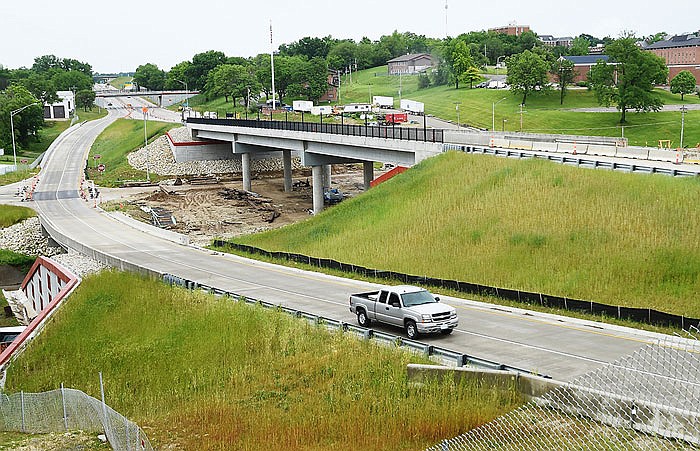Those lobbying to extend Jefferson City's half-cent capital improvements sales tax hope voters will approve it on the Aug. 3 ballot because of the strong track record of its predecessors.
The sales tax, Proposition 1, will be on the Aug. 3 ballot for its seventh five-year renewal.
The city estimates the half-cent sales tax would bring in about $5.6 million annually over the tax's five-year span for a total of $28 million.
Of that, the public works would receive the largest amount with $16.5 million allocated over five years.
Public safety would receive $5.6 million with $3.3 million going toward the fire department and $2.2 million to the police department.
Additionally, $2.8 million going to the Parks, Recreation and Forestry Department, $560,000 to IT and $2.5 million to economic development.
Ken Hussey, committee co-chairman and former city councilman, said there's a variety of important projects the half-cent sales tax helps to fund.
For instance, in the current cycle, the city used $174,759 on the streetscape, sidewalks and lighting around Capitol Avenue.
"It's the light poles downtown, it's the electrical boxes, that a lot of folks may not see, but provide increased electrical access along those streets for when you have festivals and fairs and events," he said. "So it made those particular areas more hospitable to outdoor events."
Another specific project funded through the most recent cycle was along Cavalier Drive, between Creek Trail Drive and the Mission Drive roundabout. The project also installed crosswalks at South and Thorpe Gordon elementary schools.
Hussey said the project provided the city with an opportunity to work with the school district to address anticipated transportation needs and make the area safer.
Co-chairman Andre Grinston, who also serves on the Parks, Recreation and Forestry Commission, said these projects and events at the amphitheater help to drive the city and bring in economic opportunities.
"If (people are) going to come for a concert, they are more likely to go to Central Dairy for ice cream or to Madison's and have dinner, then also probably stay at a Capitol Plaza or Holiday Inn," he said. "They are coming for one destination, which is the concert. But we can support those activities after they are finished with the concert."
The city would work with Cole County to fund some major projects each five-year cycle of the tax. The city and county contribute $5.5 million each to the projects for a total of $11 million.
If approved, the sales tax would fund four priority projects: the High Street viaduct for $5 million; pavement, sidewalk and width adjustments to the Stadium Boulevard corridor for $3 million; two-laning Monroe Street for $1 million; and economic development/grant matching for $2 million.
Hussey said the replacement of the Dunklin Street bridge, which the city paid $2.8 million for, was critical to get done and was a city-county project through the previous capital improvement sales tax.
"That's a major project that really takes care of an issue in that particular area," he said. "It fixed an aging bridge that helped with some pedestrian access as well."
Grinston agreed with Hussey that the Dunklin Street bridge was an important project, able to be completed because of the sales tax funding.
"That was out of commission for about three years but now as you drive by, it is one of the beautiful spots in Jefferson City," he said.
Hussey said the same thing needs done with the High Street Viaduct, which is on the list of projected city-county projects.
"It's just a big project that needs to get done for the safety and security of the community," he said.
While the viaduct is important for travel around the city in general, he said, it becomes vital when there's heavy flooding as it "becomes one of the only East-West corridors that allows traffic to move through Jefferson City."
Neither said they're particularly worried an increase in COVID-19 cases will impact voting in August. Grinston said he is hopeful people will continue practicing social distancing while voting.
Hussey said, with most August elections, he expects there will be relatively low voter turnout, but the pandemic won't be a large contributor to it.
"Personally, I don't think that it will," he said. "If people have concerns about voting or if they need accommodations or have questions, I would direct them to the county clerk's office.
"It's an August election, it's the only thing on the ballot, and I'm sure the county clerk would attest to this as well, that there's an expectation for low turnout to begin with," Hussey said. "So, I would think that going out to vote in person can be a safe activity."
The resident-run committee waited until after July 4 to start campaigning for the tax, but Grinston said they've given four or five presentations a week since to different groups around the area.
Both said they're getting ready to run ads and other promotions about the sales tax.
"Then some of it is just word of mouth," Hussey said. "We connect some core folks who can share it with their group of individuals, who can then share it with their circle of folks as well."

